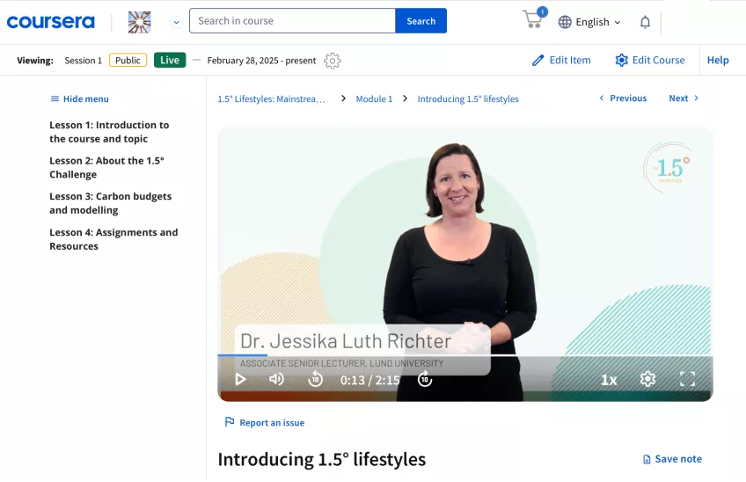At the end of February, IIIEE, together with partners from around the EU launched a new massive open online course (MOOC) 1.5° Lifestyles: everyday sustainability on the coursera platform. The course is based on the findings and insights from a 4 year research project funded by the European Union. The EU 1.5° Lifestyles project’s main aim was to foster the mainstreaming of lifestyles in accordance with the aspirational 1.5° climate target agreed by countries around the world through the Paris Agreement.
Throughout this course, we help learners explore many aspects of what we mean by 1.5° lifestyles – living sustainably, having low carbon impacts and being healthy and happy while living within planetary boundaries. We also emphasise that transitioning to 1.5° lifestyles requires not only individual changes, but also changes on a societal level – from the communities in which we live to changes to the fundamental structures and values of society.
The MOOC brings together many experts from academic institutions and non-governmental organizations around the EU to explore a range of relevant topics. This was a logistical challenge in terms of planning the curriculum and filming, but ultimately increased the diversity of academic and practitioner perspectives. From analyzing consumption patterns and behavioral drivers to considering policy implications and societal shifts, exploring 1.5° lifestyles requires a holistic perspective on the complex interplay between individuals, communities, and the environment. By critically examining real-world case studies and engaging in interactive discussions, we hope learners will acquire practical tools and strategies to foster sustainable practices in their own lives while also understanding the structural barriers that need to be addressed.

- In Module 1, we first introduce the 1.5°target and how we can think about climate targets from a consumption-based approach.
- In Module 2, we look more into the potential contributions of individuals and households in adopting lifestyle changes. In particular, we look at changes in the domains of nutrition, mobility, housing and leisure. We will also discuss the limitations and barriers for individuals and households to make the changes alone.
- In Module 3, we explore the structural changes and policies needed for a transition to a low carbon society.
While the project is based on findings from EU countries, we also know that there are different contexts beyond this relevant to learning more about 1.5° lifestyles. If we think of 1.5° lifestyles as embedded in a context, then we also should expect that individuals will have different starting points, different pathways or journeys and different contexts in which they navigate those pathways. We are also interested in those differences and understanding what 1.5° lifestyles look like in all their varieties. To this end, the course also encourages sharing of experiences from all participants – through the course project and forum discussions – and this is another valuable source of learning in this course. The course project itself challenges learners to implement a lifestyle change for a couple of weeks and observe the enablers and challenges that make this change one they would implement permanently or not. The project asks them to reflect not only on their experience, but others’ experiences and the structures of society around them. Through this project design, we are experimenting with more transformative learning and hope in the future to have more to share about this!

